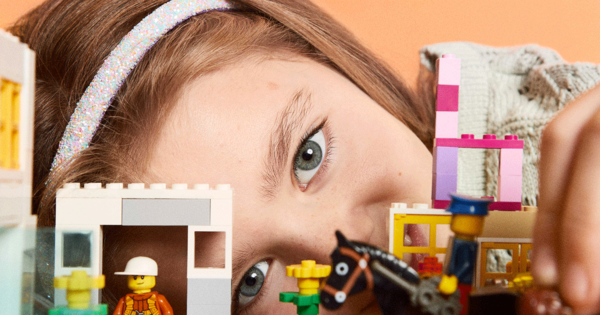Lego’s Message to Girls and Their Parents: Ditch Perfectionism

Girls are facing a crisis of creative confidence, according to new findings from The Lego Group. Ahead of International Women’s Day (March 8), the brand launched a major initiative highlighting how language bias and the pressure of perfection can stifle girls’ creativity.
The second installment of Lego’s “Play Unstoppable” campaign, which aims to challenge gender stereotypes and empower girls, comes after the brand commissioned global research into the societal trends affecting children’s creative confidence. The study—of more than 61,500 parents and children between five and 12 years old across 36 countries—revealed that girls’ confidence in their creativity declines as they get older.
Their declining confidence can be compounded by two prevailing issues: everyday language and the expectation to be perfect. Two-thirds of girls said the language they hear can make them feel like they shouldn’t experiment and make mistakes, while three in five girls reported feeling pressured by society’s messages of perfection.
The majority of parents also noted that gendered descriptions are commonly used to assess the creative outputs of male versus female creators, with terms such as “pretty,” “cute” and “beautiful” commonly attributed to girls, while words such as “brave,” “cool” or “genius” are more often applied to boys.
For Lego, these findings are significant, as it sees itself as a champion of creativity. More than three-quarters of girls aspire to work in creative industries, per the study, which underscores the need to support and cultivate their creativity for the long term, said Alero Akuya, vice president of brand development at The Lego Group.
Lego illustrated the research findings in a film, “More Than Perfect,” which sets up an experiment among girls and their parents. In the first scenario, girls are told to build a “perfect” playground with Lego bricks, and they hesitate over their projects.
In the second challenge, they’re invited to build “any” playground, with “no right or wrong.” The outcome is “instantly light-hearted,” Akuya observed. “They’re even collaborating better. There’s an air of freedom.”
“This shows that even with a slight change in language choice, you can create such a meaningful impact with kids,” she added.
Supporting parents
Along with resonating among girls, Lego’s campaign wants to aid and equip parents. It will unfold through five initiatives supporting kids and families.
The first is a series of creative workshops, taking place at Lego stores and online throughout the year, which invite creators aged six through 12 to play around passion points including entertainment, space and gaming.
Starting in April, the Lego Life application will host content focused on building creative confidence.
Lego also released a 10-step guide for parents to foster creative confidence in their children. Developed with Harvard University-trained parenting researcher and author Jennifer B. Wallace, the resource includes tips on language choices and how to encourage children to create things even through mistakes.
Internally, the brand is holding training for employees about inclusive language and gender biases.
Finally, to work toward systemic change, The Lego Group and Lego Foundation partnered with Save the Children to host programs in schools and youth clubs in countries such as China, Mexico, Vietnam and Indonesia.
“There’s no silver bullet to solve this,” Akuya said. “But changing our everyday language is something that’s available to all of us.”
Lego itself has been on a journey to become more inclusive and eradicate gender stereotypes in the toy industry. In 2020, it partnered with the Geena Davis Institute on Gender in Media to conduct an internal audit that led to it removing all gender labels from its products.
CREDITS:
The LEGO Group
Head of Brand & Portfolio Comms: Laura Misselbrook
Global Brand and DEI Comms Lead, Brand & Portfolio Comms: Denise Lauritsen
Senior Communications Manager, Brand & Portfolio Comms: Ida Rosendahl
Global Creative Lead, Play Inclusion, OLA (Our LEGO Agency): Pia Chaudhuri
Global Brand Director, D&I, Brand Development – Carolina Teixeira
EXPOSURE
Head of Strategy: Nicola Davies
Creative Director: Sally Green
Executive Creative Director: Robin Ek
Executive Producer: Bhavisha Patel
Senior Producer: Natasha Buddle
CEO: Maneeze Chowdhury
Client Partner: Alex Darling Wilson
Design Director: Russell Hunt
Publicity: Jody Halliday
TREEHOUSE
Director: Jessie Ayles
Executive Director: Matt Rendell
Producer: Francesca Di Muro
Production Assistant: Cindy Veleva
DOP: Kia Fern Little
https://www.adweek.com/creativity/legos-message-to-girls-and-their-parents-ditch-perfectionism/